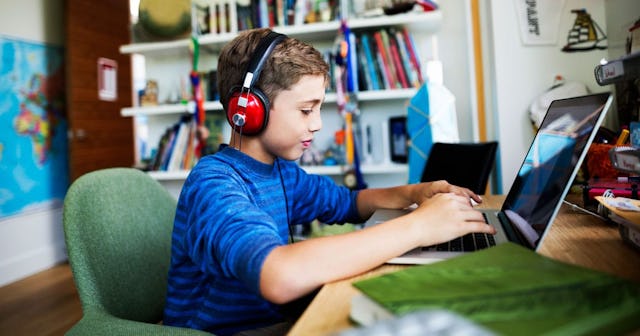Survey Says Almost Half Of Kids Are Chatting With Strangers Online

New research has unveiled some information about ways that children are using the internet, reminding us how important it is to monitor their online activity
We all know that the internet can be a potentially scary and unhealthy place. A recent survey conducted by the Center for Cyber Safety and Education might be reason enough for parents to up their web monitoring game. The group surveyed fourth to eighth graders — so kids, not teens — and found that 40 percent of them had used the web to connect with a stranger online. Of course, stranger doesn’t necessarily imply that they are chatting with an adult, or even someone scary. Just someone that they don’t know in real life — which is definitely something parents should be aware of.
RELATED: The Modern Parent’s Guide To Internet Safety For Kids
Furthermore, over half revealed they gave their phone number to a stranger, 21 percent admitted to speaking to a stranger on the phone, and 30 percent texted a stranger. Some — 15 percent —even attempted to see the stranger in the flesh, with 11 percent meeting up with a stranger at their home, the stranger’s home, a park, mall or restaurant, and 6 percent giving a stranger their address.
Again, let’s reiterate that some of these communications are possibly innocent and involve kids being kids and just meeting same-age peers online, whether via social media or online games. But of course, when it comes to kids talking to strangers online, there is reason for concern — especially since many of the kids admitted to “breaking the rules” their parents laid down. 29 percent copped to using the internet in ways their parents wouldn’t approve, while over 20 percent claimed they watch adult programs and almost a third have lied about their age to access adult websites.
Another reason for concern is that apparently, kids are also on the web all hours of the night, with 49 percent claiming to be online at 11 pm or later on a school night and 33 percent online until after midnight. This means it is likely that kids are still online after lights are out.
In addition to connecting them to potentially dangerous people, there are other unfavorable ways the web can impact children, like negatively impacting their self-esteem or encouraging them to complete totally absurd challenges involving ingesting potentially lethal household items like Tide Pods. So, one of our jobs as parents is making sure our children are protected from the dark side of the web, which includes monitoring not only what they are doing when they log onto the web, but when they are doing it.
For instance, take the time to set up parental controls on websites such as YouTube. Or, if you are really worried, follow in the footsteps of some parents who sign up for apps designed to alert them to potential dangers their children could be exposed to. You could always go the old school route and just take their smart phone, tablets and laptops away from them at night, similar to the way our parents would take our landline phones away.
But most importantly, talk to your children and educate them about the potential dangers online. After all, it is quite likely that at some point in their young lives they are going to meet a stranger online, and better safe than sorry.
This article was originally published on